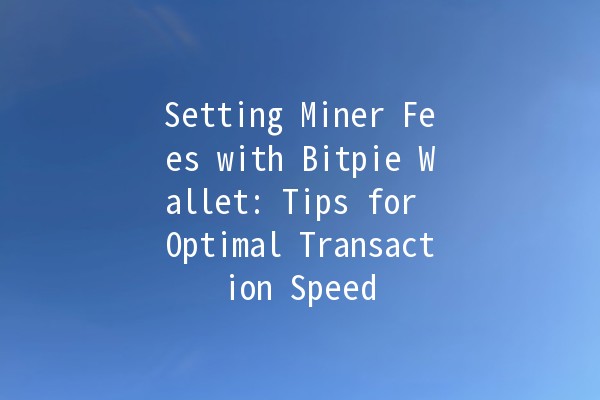




When it comes to transacting in cryptocurrencies, understanding miner fees is essential for ensuring timely transaction confirmations. The Bitpie wallet offers a userfriendly interface for managing these fees, allowing you to adjust them according to your needs. In this article, we will explore how to set miner fees in Bitpie Wallet, focusing on five practical productivityboosting techniques to help you optimize your wallet experience for both speed and efficiency.
Miner fees, also known as transaction fees, are fees you pay to miners to process your cryptocurrency transactions. These fees incentivize miners to include your transaction in the blockchain as quickly as possible. If you set a low fee, your transaction may take longer to confirm, especially during peak network congestion. Conversely, setting a higher fee can expedite the confirmation process.
When sending transactions, Bitpie Wallet allows you to select a flat fee option. This can be beneficial if you're dealing with a straightforward transaction and want to avoid fluctuations in fees.
When sending 0.5 BTC, you can choose a flat fee (e.g., 0.0005 BTC). This option ensures you won’t be surprised by sudden fee hikes due to network congestion, securing your transaction at a predictable cost.
Before setting your miner fee, it's crucial to assess the current state of the network. Bitpie Wallet may provide realtime information on average fees, allowing you to make informed decisions.

If you notice the typical fee is lower than usual, consider using this opportunity to send urgent transactions at a reduced rate. For instance, if the average fee drops to 0.0003 BTC, you could save money while ensuring a timely transaction.
Bitpie Wallet may enable dynamic fee settings based on realtime market conditions. If you're using this feature, set your wallet to automatically adjust fees based on demand—that way, you won't have to worry about manual adjustments.
This is particularly useful during volatile market periods. If you send funds during a surge in demand, your wallet can adjust the fee automatically to ensure your transaction goes through without delays.
If you have transactions that require immediate attention, Bitpie Wallet allows you to prioritize them by setting a higher miner fee.
For a transaction worth a significant amount, like sending $10,000 worth of cryptocurrency, you might opt for a priority fee of 0.001 BTC. This ensures miners will prioritize your transaction, allowing it to skip the queue during busy times.
It’s vital to review your typical transaction fees regularly and adjust your strategies accordingly. This practice will help you gain a deeper understanding of how fees fluctuate and how they can affect your transactions.
After conducting several transactions, you can analyze what fee settings generally result in timely confirmations. If a typical fee of 0.0004 BTC repeatedly allows for quick confirmations, you can confidently use that fee in future transactions.
While optimizing miner fees is crucial for transaction speed, balancing this with security is just as important. Always ensure that you’re transacting only when necessary and with trusted parties to avoid unwanted risks.
Staying active on forums or communities related to cryptocurrency can provide valuable insights into best practices and emerging trends regarding miner fees. Engaging with other users can also help identify optimal settings for various scenarios.
, setting miner fees in Bitpie Wallet is not just about processing transactions efficiently; it also requires an informed approach to balancing speed and cost. By using flat fees, monitoring network conditions, utilizing dynamic settings, prioritizing important transactions, and regularly reviewing fees, you can significantly enhance your cryptocurrency transaction experience. Always prioritize security alongside speed to protect your assets effectively.
Miner fees are payments made to miners for processing and confirming transactions on the blockchain. They incentivize miners to include your transaction in the next block and directly affect how quickly your transaction is processed.
Bitpie typically provides realtime network statistics inside their wallet interface. Reviewing these statistics helps you set appropriate fees for your transactions.
Once submitted, you cannot modify the miner fee for that transaction. However, you can send a new transaction with a higher fee in cases of delays.
Transaction times can vary based on network congestion. If the miner fee set is lower than average, it may delay the processing.
Other wallets offer similar functionalities, but it’s essential to choose one that fits your needs. Compare features like fee setting, ease of use, and security before opting for an alternative.
Bitpie Wallet offers customer support through their official website and community forums where users can report issues or seek assistance related to fees and transactions.
By adopting these practices, you can successfully navigate the world of cryptocurrency transactions and manage your miner fees effectively with Bitpie Wallet.